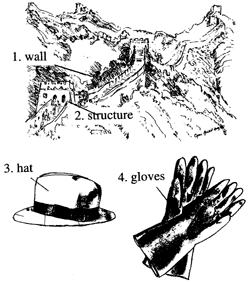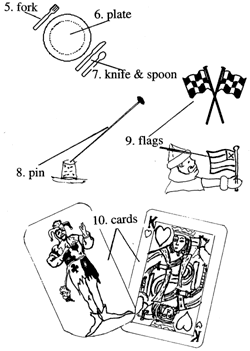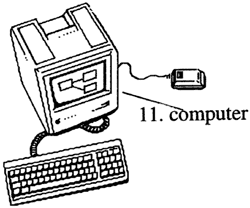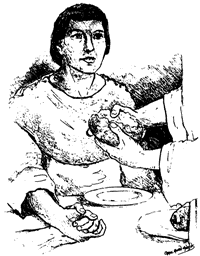Unit 29: Order
順序
Pictured Words
描かれた単語
New Words
新しい単語

| 1. wall
壁 |
| 2. structure
構造 |
| 3. hat
帽子 |
| 4. gloves
手袋 |

| 5. fork
フォーク |
| 6. plate
版 |
| 7. knife and spoon
ナイフ及びスプーン |
| 8. pin
ピン |
| 9. flags
旗 |
| 10. cards
カード |

| 11. computer
コンピュータ |
Nouns
名詞
カード
破片
コンピュータ
服
旗
手袋
帽子
空
ホック
葉
ライン
鼻
苦痛
ピン
版
ポイント
選択
開始
錫
連合
壁
Sayings
格言
The gloves are near to my hat, far from that point over there.
手袋はそのポイントにはほど遠い私の帽子に、向こうに近くある。
The wrong cards always put me far from winning.
間違ったカードは常に勝利からの私をずっと置く。
Trees are far from beautiful in winter.
木は冬の美しいから遠い。
His plate is far from empty.
彼の版は空から遠い。
A computer is near necessary for business.
コンピュータはビジネスに必要の近くにある。
A pin is near as good as a hook for fishing.
ピンは釣のためのホックよい近く。
The hollow in those leaves is near full of water.
それらの空は水の十分にの近くにある去る。
She made a near record selection of hats, dresses and gloves for the union's competition.
彼女は連合の競争のための帽子、服および手袋の近く記録的な選択をした。
Order
順序
Near and far show the position of one thing with respect to another.
の近く及び遠いショー別のものに関する1 つの事の位置。
They are often said as near to or far from the thing they have relation with.
彼らは頻繁に関係をとの有する事にまたはから遠くに近くとして言われる。
But the preposition to may be left out, as in the examples for near:
しかし前置詞近いのための例でように、省かれるかもしれない:
Near
の近く
this town, now, is near, and it is a little one.
この町は、今、近くあり、小さい1 時である。
better is a neighbour who is near than a brother far off.
ある隣人は兄弟よりよりよいずっと。
you see that the summer is near.
夏が近くあることを見る。
be not far from me, for trouble is near.
私から遠くないがあってはいけない、なぜなら悩みは近くある。
Far
ずっと
Let such a thing be far from you.
そのような事があなたから遠いがあるようにしなさい。
keeping himself far from evil.
彼自身を悪から遠い保つ。
let it be far from God to do evil.
悪をするためにそれ割り当てられる神から遠いがありなさい。
you are not far from the kingdom of God.
神の国にはほど遠くない。

He Walked Beside Them
彼はそれらの側で歩いた
And then, two of them, on that very day, were going to a little town named Emmaus, which was about seven miles from Jerusalem.
そして次に、それらの2 つは、その非常に日にエルサレムからの約7 マイルあったEmmaus と示された小さい町に、行っていた。
And they were talking together about all those things which had taken place.
そして彼らは起こったすべてのそれらの事について一緒に話していた。
And while they were talking and questioning together, Jesus himself came near and went with them.
そして彼らが一緒に話し、質問している間、イエス・キリスト彼自身は近く来、それらと行った。
But their eyes were not open that they might have knowledge of him.
しかし彼の知識を持つかもしれない目は開いていなかった。
And he said to them, What are you talking about together while you go?
そして行く間、彼それらの何に述べている一緒に言ったか。
And he made clear to them all the things in the Writings, from Moses and from all the prophets, which had to do with himself.
そして彼はそれらに執筆の、Moses からのそして彼自身としなければならなかったすべての予言者からの事すべてを明らかに作った。
And they came near the town to which they were going, and he seemed as if he was going on.
そして彼らは行っていた、彼はようである町の近くに彼が継続していたように来。
But they kept him back, saying, Do not go, for evening is near, the day is almost gone.
しかし彼らは彼を、言、行かない保った、なぜなら夕方は、日ほとんど行く近くある。
And he went in with them.
そして彼はそれらと行った。
And when he was seated with them at the table, he took the bread, and said words of blessing and, making division of it, he gave it to them.
そして彼がテーブルのそれらと着席したときに、彼はパンを取り、天恵の単語を言い、分割をそれのして、それらにそれを与えた。
And then their eyes were open, and they had knowledge of him;
そして目は開いて、彼の知識を有した;
but he went from their view.
しかし彼は意見から行った。
And they said to one another, Were not our hearts burning in us while he was talking to us on the way, making clear to us the holy Writings?
そして彼が方法の私達に話している間、私達の中心は私達で互いに燃え言い、神聖な執筆を私達に明らかに作るか。
And that very hour they got up and went back to Jerusalem, where the eleven and the others had come together.
そしてその非常に時間彼らは11 および他が一緒に来たエルサレムに起き、行った。
Additional Reading
付加的な読書
This great story has been the experience of many men and women throughout time.
このすばらしい物語はずっと時間中の多くの人そして女性の経験である。
They, too, have got a fresh view on life when they had "a meeting with Jesus".
彼らは、余りに、"イエス・キリストとの会合" を開いた生命の新しい意見を持っている。
Have in mind that these two men were very sad.
この2 人が非常に悲しかったこと心で持ちなさい。
They had come to a bitter experience when their Master had been put to death by the rulers of their land.
彼らは苦い経験に彼らのマスターが彼らの土地の定規によって死に置かれる前に来た。
Then a stranger came to them and he gave them the new view on things that they had so much need of.
それから他人はそれらに来、彼はそれらに彼らが必要性をそんなに有した事の新しい意見を与えた。
That stranger was Jesus.
その他人はイエス・キリストだった。
We may take note that he made out he would go on.
私達は彼が彼を行く作ったノートを取るかもしれない。
Only when they said to be with them for the night, did he say, yes.
彼らが夜の間それらとあると言ったときにだけ彼は言う、はい。
He did not seem to be forceful.
彼は説得力がなかったようでない。
It was to be their decision.
それは決定であるべきだった。
They might have their friend with them, or they might not.
それらにそれらを持つ友人があるかもしれないかまたはかもしれなかった。
But, if he had gone on, they would never have seen this stranger as being their master.
しかし、彼が継続したら、彼らは会い彼らのマスターであるとして決してこの他人に。
It was when the stranger took the bread in his hands that they saw who he was.
それは他人が彼がだったかだれ彼らが見た彼の手のパンを取ったときだった。
Some say that the two men may have been with Jesus when he gave food to the five thousand from only five loaves of bread and two small fish.
ある人々は彼がパン及び2 匹の小さい魚の5 つの塊だけからの5 千に食糧を与えたときに2 人がイエス・キリストとあるかもしれないと言う。
You have already been given that story.
既にその物語を与えられてしまった。
If so, they would have seen his hands taking hold of the five loaves then.
その場合、彼らは彼の手を5 つの塊の把握をそれから取ることを見よう。
But it is certain that this was no formal event, and not a special religious practice, like a "communion".
しかしこれが形式的なでき事でなかった、"聖餐" のようなない特別な宗教練習、であることは確か。
Many persons have seen him in such everyday experiences since that time: in their houses;
多くの人は時間を計るそのような毎日の経験の彼にその後会っていた: 家;
in the offices at work;
仕事のオフィス;
in the fields, forests or on the beaches when at work or at play.
の分野、森林または浜場合のの仕事または演劇。
This meeting with the stranger was a great event for the two men.
他人とのこの会合は2 人のための大きいでき事だった。
Whereas the two had been taking a road that went to the west and away from Jerusalem, they now went in the opposite direction.
ずっと2 つが西にそしてエルサレムから行った道を取っていた一方、反対の方向で今行った。
They had been journeying to the sunset but now they turned east to the sunrise.
ずっと彼らは日没に旅行していたが、今日の出に東を回した。
They had great news to be told, so within the hour they were on their way back to Jerusalem.
彼らは言われるべきすばらしいニュースを有した従って時間の中ではエルサレムに彼らの方法背部にあった。
They could not have a sleep and do it tomorrow!
彼らは睡眠を有することができなかったし、それを明日しない!
They had to do it now!
彼らはそれを今しなければならなかった!
True friends always give each other good news quickly like that.
真の友達は常にそのように互いによいニュースをすぐに伝える。
What a surprise met them there.
なんと驚きそれらにそこに会ったか。
In Jerusalem, Peter had seen Jesus too.
エルサレムでは、ピーターはイエス・キリストに会ったも。
Helpful Notes
有用なノート
| Jerusalem
エルサレム | the central town of Palestine, we now say the capital.
パレスチナの中央町、私達は今首都を言う。 |
| talking and questioning
話すことおよび質問 | question and answer about things.
事についての質疑応答。 |
| said words of blessing
天恵の前述の単語 | gave thanks for the bread.
パンへの感謝を与えた。 |
| hearts burning
中心燃焼 | a feeling of great pleasure.
大きい喜びの感じ。 |
| bitter experience
苦い経験 | a great amount of trouble.
悩みのすばらしい量。 |
| not seem to be forceful
説得力がないようである | not trying to make their minds change.
心を作ることを試みなくて変えなさい。 |
| no formal event
形式的なでき事無し | it was quite a natural happening.
それは自然な出来事かなりだった。 |
| communion
聖餐 | a set order of church service.
教会サービスのセットの順序。 |
| turned east to the sunrise
日の出への回された東 | turned from the way they had in mind.
方法から回されてそれらは心で持っていた。 |
Interesting Facts and Records
興味深い事実および記録
Records and Writings
記録及び執筆
In early times there were no written records of ownership.
早い時に所有権の文書による記録がなかった。
Arguments about property were dependent upon ideas of past connections.
特性についての議論は過去の関係の考えに依存していた。
The time one's fathers had lived in a place was important.
父が場所に住んでいた時間は重要だった。
The idea was that they were still living and watching from afar.
考えは彼らがだったことであり遠くからまだ住み、見る。
And so, it came about that one should have knowledge of his past.
そしてそう、それはそのについて彼の過去の知識を持つべきである来た。
His records were kept on a stick that became a union with his long line of fathers.
彼の記録は父の彼の長距離回線部門が付いている連合になった棒で保たれた。
The son of a property owner would say the record over as the stick was slowly turned.
財産所有者の息子は棒がゆっくり回ったと同時に記録余分を言う。
Then it would be put in a place of honour.
それからそれは名誉の場所に置かれる。
It became the household god.
それは世帯の神に似合った。
It was a serious thing to Laban when Rachel stole his household gods.
それはLaban へRachel が彼の世帯の神を盗んだときに深刻な事だった。
They had both a religious connection and a property ownership relation.
彼らは宗教関係および特性の所有権の関係を両方有した。
It may well be that putting records on a stick gave them only a small amount of space in which to have them cut.
それは棒に記録を置くことがそれらにそれらを切れてもらうため少しのスペースしか与えなかったことである湧き出るかもしれない。
In much the same way as now, space was important.
ほぼ同様に今として、スペースは重要だった。
In those days a long line of fathers had to go on one stick, so vowels were left out.
それらの日では父の長距離回線部門は1 本の棒で行かなければならなかった従って母音は省かれた。
A like thing has happened in our own time.
事のようなA は私達の自身の時間に起こった。
Computer statements had to be short with our early chips.
コンピュータ声明は私達の早い破片と短くなければならなかった。
They were not large enough for long ones.
それらは長い物のために十分に大きくなかった。
The vowels were left out until we got larger units.
母音は私達が大きい単位を得たまで省かれた。
Short records do have their value.
不足分の記録に価値がある。
It is not easy to give clear arguments about early times, but we do know that early records were short.
それは容易与える早い時についての明確な議論をでないが、早い記録が短かったことを私達は知っている。
This we have learned from all the plates of earth which were found around early towns.
私達が早い町のまわりで見つけられた地球のすべての版から学んだこれ。
The writing on those plates was made with a short piece of stick with a sharp, flattened point.
それらの版の執筆はシャープの棒、平らにされたポイントの短い部分となされた。
Its end was put into the soft wet earth to make marks before the plates were put out to dry.
印を作るためにその版が乾燥するために消された前に端は柔らかいぬれた地球に入った。
Naturally, the smaller the space used, the easier it was to take hold of the plates.
より小さいスペース使用される、自然に、より容易それは版の把握を取ることだった。
Writing in Mesopotamia was short.
Mesopotamia に書くことは短かった。
In Egypt, important rulers had special rooms for when they died.
エジプトでは、死んだときに重要な定規に特別な部屋がのためのあった。
These were made attractive by pictures on the walls.
これらは壁で映像によって魅力的になされた。
They gave an advertisement of their life's main acts.
それらは生命の主要な行為の広告を与えた。
Writing there was with pictures.
そこに書くことは映像とあった。
Moses started his life as a chief in Egypt.
Moses は彼の生命エジプトの責任者として始まった。
He was given teaching in the reading of these pictures.
彼はこれらの映像の読書の教授を与えられた。
But, he would also have been taught to read much shorter forms of writing.
しかし、彼はまた執筆の大いに略式を読むように教えられよう。
This was with letters that were written onto leaves of water-plants.
これは水植物の葉に書かれていた手紙とあった。
So, there were different forms of writing.
そう、執筆の異なった形態があった。
Because of small space the writing automatically was kept to the least number of letters possible.
小さいスペースのために執筆は手紙の最少数に自動的に可能保たれた。
A big adjustment was made when the different systems of writing were put together into one system.
大きい調節は執筆の異なったシステムが1 つのシステムに組立てられたときになされた。
That was the result of trade and transport between the nations of the time.
それは時間の国家間の貿易そして輸送の結果だった。
This development was made in North Palestine by persons who went sailing in ships in the Great Sea the Mediterranean.
この開発は大きい海の船で内陸を航海することを行った人によって北のパレスチナでなされた。
The Hebrew language came from that development.
ヘブライ言語はその開発から来た。
It may well be for such reasons that Hebrew does not have letters for vowels, only for consonants.
それはヘブライが母音のための手紙を持っていない子音のそのような理由のためである、しか湧き出るかもしれない。